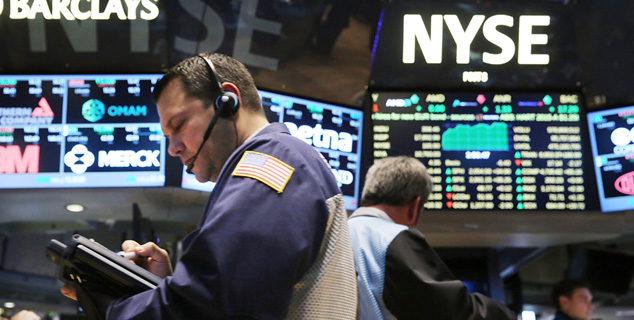
US stocks are lining up for a very positive start this afternoon, as talk of the European Central Bank (ECB) launching a quantitative easing (QE) programme continues to persist and harden up.
Late morning futures were indicating that the S&P 500 will open nine points higher at 2,053 with the Dow Jones jumping 87 points to 17,824. Nasdaq is seen gaining 20 points to 4,233.
CNBC, citing “a source close to the ECB”, reported this morning that the bank could be ready to announce a QE programme based on the contributions made by national central banks to the ECB.
Germany, for instance, pays in 17.9% of the total contributions to the ECB, while France contributes 14.2%. The idea is the level of this paid-in capital contribution would determine how much of that country’s sovereign debt the central bank would purchase, according to the source.
Jasper Lawler, analyst at CMC Markets, says that the ECB QE rumour mill is boosting global risk-assets and pressuring the euro. His colleague, Michael Hewson, adds: “Given the number of hints dropped in recent days by ECB president Mario Draghi that the Bank was getting ready to do significantly more to offset weak prices, markets had been getting somewhat ahead of themselves as they looked to factor in a significantly large stimulus program.
There was news last Friday that a programme of €500bn was being discussed at the ECB. While not insignificant, this is “far short of what is needed at this time, and more importantly what markets appear to have been expecting, or hoping for”, says Hewson.
A move up by US stocks at open would follow a disappointing show in New York last Friday, when Dow Jones gave up 170 points, or nearly 1% ,and the S&P 500 finished 0.84%, or 17 points, lower. That performance followed a US unemployment report showing the number of jobs created in December exceeded expectations but that wages declined during the month.
Hewson, says of the data: “The weakness in the wage growth numbers is particularly worrying at a time when US valuations are significantly higher than here in Europe, while the recent fall in the crude oil price will undoubtedly act as a significant boost to US incomes, the fact that wages are rising so slowly when the US economy is apparently booming, must be a concern.
“This in turn raises the question as to whether current valuations accurately reflect the current strength of the US economy at this time, at a time when the Federal Reserve could be on the verge of raising interest rates.
“Friday’s data on wages would seem to suggest that an imminent move in that regard is unlikely at this point, or in the next few months, but stock markets appear to be stuck in a no-man’s land of a retreating Fed and an unconvincing economic recovery.”
Investors will today also begin gearing up for the start of US fourth quarter earnings season. Alcoa is due to report after hours today, but Lawler says the big focus for this week will be reports from the big banks, with Bank of America, JP Morgan Chase, Goldman Sachs, Wells Fargo and Citigroup all on the runway.
He adds: “The worry for fourth quarter earnings is that US multinationals start to really feel the bite in their foreign earnings from the stronger US dollar.
“The US dollar index has been rallying since the summer and is now at 12-year highs. The size and the duration of the move higher in the US dollar cannot help but hurt US exporters and help importers leading to a readjustment of winners and losers in fourth quarter earnings.”
He notes fourth quarter releases from the energy sector will also be keenly eyed. “The sector has been crushed in the past three months and the fourth quarter updates from its constituents will offer some ideas on how deserved the stock price declines have been.”